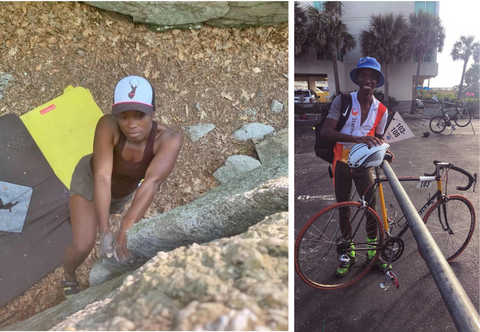Diversify Triathlon Movement
Earlier in 2020, Vanessa Foerster launched the Diversify Triathlon Movement, aimed at breaking down barriers for Black athletes and increasing the diversity in triathlon, a predominantly white sport. Vanessa paired athletes with coaches and got some of the best brands in the sport to back the movement, including Zealios! All athletes received a welcome packet of the Zealios necessities for swim, bike, run and recovery. Round one recently wrapped up and we got a chance to speak to Mishana Klein and Saeed Jones, two of the athletes!
Mishana Klein is a nurse, mother and rock climber. She was paired with Marni Sumbal of TriMarni Coaching. Saeed Jones is a Civil Engineer and Track/Cross Country Coach from Summerville, South Carolina. He ran D1 Track and Cross Country at North Carolina A&T State University (Aggie Pride!) and has transitioned into multisport over the last 2 years. He was coached by Alyssa Godesky of Biscay Coaching.
What interested you in participating in the Diversify Triathlon Movement?
Mishana: On January 1st I signed up for my first triathlon ever! New year, new challenge. I immediately started training since I felt weak in each category. When the pandemic hit, I lost my drive and motivation. I stumbled across DTM and was excited to apply. I wanted to see other athletes like me and join them in navigating this new sport. A safe network where I don’t have to feel dumb for asking basic questions.
Saeed: I viewed it as both a personal challenge and a chance to learn about a sport that I could bring to the attention of other minority athletes. The program looked to offer direction that you could not find through a random Google search in a setting that would be more comfortable to BIPOC athletes. Coming from an HBCU, I understood the benefit of training and competing with a group that you could identify with on an athletic and cultural level. All of my training in multisport has been with predominantly (if not all) white teams. The camaraderie in that area has been affable more times than not, but I longed for an opportunity to connect with a group where I wouldn’t be considered an anomaly; a chance to practice and race with no hesitation about the team dynamic. DTM came across my feed at just the right time.

How was training? What challenges did you face?
M: I really enjoyed the training. I’m primarily a rock climber, so having a goal directed workout is already familiar. My biggest challenge was gaining access to a pool. Very strict COVID restrictions kept pool/gyms in Philadelphia closed for quite a while. It took a long time to regain the progress I made in the pool. Also got a little creative in the backyard with my kiddo’s inflatable pool. Desperate times!
S: Training was great, and my coach Alyssa Godesky was a fantastic resource throughout the entire process. Swimming was an early challenge since bilateral breathing was a foreign concept to me. We spent the first 2 weeks exclusively in the pool nailing down breathing and form. After that we were full steam ahead on the three race disciplines.
What goals do you have for triathlon?
M: I would feel personally fulfilled if I could compete a half Iron Man. And as always get faster, better, stronger!
S: I would like to work my way up through all the competition distances to Ironman. A shot at Kona is not out of the realm of possibility, and I’d like to improve my swimming enough to be considered for some relay teams in the future.

What are some of the barriers to sport for Black athletes? How did this program help eliminate some of these?
M: The biggest barrier to sport for Black athletes is access. Access to expensive gear. Access to gyms. Access to adequate training information. Access to friends who also engage in these sports. DTM providing me with training assistance was a god send. I was floundering alone with google searches; scared to join my local triathlon club because all white. My coach sent me materials, plans, and answered all my questions from my personal mental health to how to push past physical barriers.
S: Awareness of the sport and organized training are two of the most critical areas that Black athletes are lacking in. Considered a “white” sport from the outside looking in, many athletes with the skill set to compete are either completely unaware or do not see themselves represented in triathlon. Those who attempt to fill that void may typically fall into the self-training category or the black sheep of their local triathlon team. The DTM program acknowledged this reality and created a space where stereotypes and the subconscious weight of being a minority in the sport could be flipped on its head. It connected us with coaches and sponsors (like Zealios) that provided us a level of comfortability that allowed the athletes to thrive and become the representatives that we longed to see.
What changes would you like to see in the triathlon arena to be more inclusive?
M: First I would like the triathlon world to recognize that there IS an issue. The initial reaction is always defensive. Gaslighting us black athletes. Second, I would love to see more athletes of color highlighted. They’re out there, but languish in obscurity.
S: Presenting multisport clinics to underserved communities and supporting the growing number of HBCU cycling and triathlon teams would be a great place to start. An initiative to teach minorities how to swim would greatly increase the number of athletes who could come over to the sport. More price conscious equipment could also be a great asset to the mission of inclusivity. Triathlon bikes and wetsuits are bank breakers for many athletes and just those figures alone are enough to turn some people away from the sport before they even give it a try.

Any sage words of wisdom for new triathletes?
M: You will fall off your bike, so carry band aids and ointment in your emergency kit. Join groups on Facebook. Nothing is better than having that whole group support you, when you shave 15s off your swim time. And celebrate your progress!
S: Competition is a universal language, and you should never feel excluded from the conversation. This is a sport full of intimidating distances, expensive equipment, and fitness levels that would break many professional athletes from other disciplines; but you can still have your say. You do not have to succumb to the pressure of the big events and numbers. Let that local sprint be your playground. That 20lb steel frame mountain bike has two wheels and a chain just like any other bike and it will get you around. Afraid of the swim, take your time and learn the right technique. It is not about the sport, it’s not about the championships and medals, it’s about doing what you love to do. The story in which you quit will never be as good as the one where you finished. If you are a BIPOC athlete who would like to live out your own triathlon story, DTM has a place for you.



